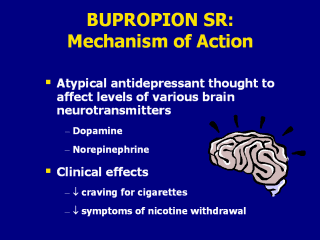| front |1 |2 |3 |4 |5 |6 |7 |8 |9 |10 |11 |12 |13 |14 |15 |16 |17 |18 |19 |20 |21 |22 |23 |24 |25 |26 |27 |28 |29 |30 |31 |32 |33 |34 |35 |36 |37 |38 |39 |40 |41 |review |
 |
Bupropion is an atypical antidepressant thought
to affect the levels of brain neurotransmitters (e.g., dopamine,
norepinephrine). By blocking neural dopamine or norepinephrine uptake in the
central nervous system, bupropion decreases the craving for nicotine and
symptoms of withdrawal (Fiore et al., 2000). Recall that the dopaminergic
system is thought to play a role in self-reinforcing behavior (reward
pathways) and dependence, whereas noradrenergic effects are thought to
prevent the symptoms of nicotine withdrawal. Bupropion SR has been shown to promote long-term abstinence when compared to placebo and to decrease the cravings for cigarettes and symptoms of nicotine withdrawal (Hurt et al., 1997). Fiore MC, Bailey WC, Cohen SJ, et al. Treating Tobacco Use and Dependence. Clinical Practice Guideline. Rockville, MD: U.S. Department of Health and Human Services, Public Health Service, 2000. Hurt RD, Sachs DP, Glover ED, et al. A comparison of sustained-release bupropion and placebo for smoking cessation. N Engl J Med 1997;337:1195–1202. Slide is used with permission, Rx for Change: Clinician-Assisted Tobacco Cessation. Copyright © 1999-2007 The Regents of the University of California, University of Southern California, and Western University of Health Sciences. All rights reserved. |